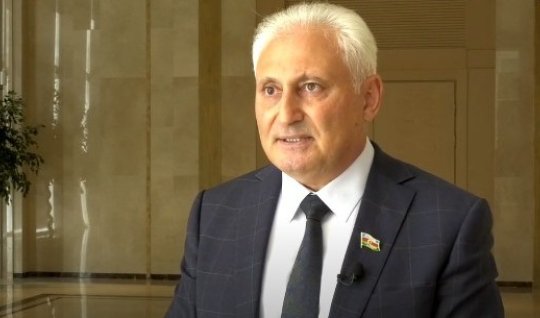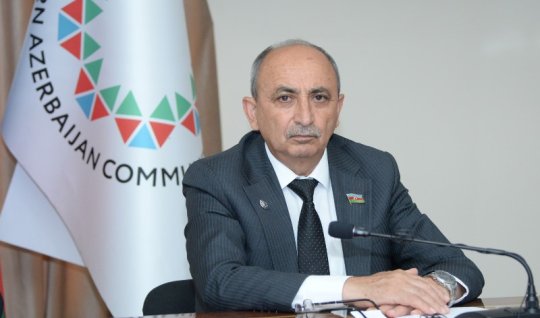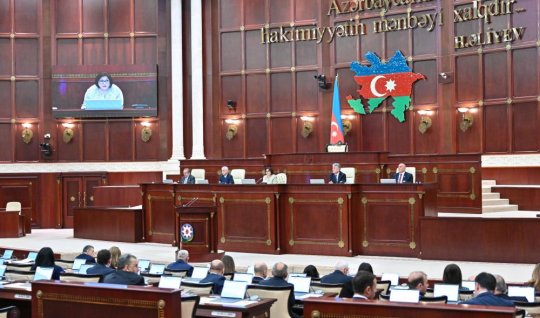Common heritage of the Turkic world - Atatürk

On this day in 1938, the news of the death of Mustafa Kemal Atatürk, one of the great leaders of the Turkic world and the founder of the modern Republic of Turkey, was announced.
This news, which plunged the Turkish nation into mourning, also deeply saddened the world. The writings in the world press regarding his death prove this.
Writings in the World Media
Extensive coverage was given in the press of most countries around the world regarding Atatürk's death; for example, Denmark's "National Tidende" publication called Atatürk the miracle of the 20th century.
Great Britain's “Daily Telegraph” publication: “Women have not advanced so rapidly in any other country. Such a degree of change in a nation is truly an unprecedented event in history.”
Germany's "Börsen-Zeitung" publication: “Germany is amazed by Atatürk's work and struggle and sees in him a powerful personality whose historical creativity will remain a symbol for all freedom-loving peoples.”
France's "L’Illustration" publication: “History has seen many great figures—Alexanders, Napoleons, Washingtons. But in the 20th century, Atatürk, this Turk, son of a Turk, broke the record for greatness.”
Austria's "Neue Freie Presse" publication: "The Turkish people lost their savior and father."
This list could be extended considerably. The praises written in honor of Atatürk were by no means accidental. Despite being a soldier, a pasha, and spending a significant part of his life in war, Atatürk did not love war. He considered war only as a last resort for self-defense. This enlightened and brilliant leader desired peace not only for his own country but for the entire world, and he said: "Peace at home, peace in the world!". Atatürk established and gifted the republican regime to the Turkish nation, which had emerged victorious from a difficult war with great effort and faced numerous problems. On the other hand, he carried out serious reforms to increase the nation's education level. He personally wrote history books. With the alphabet revolution, he raised literacy rates. He had the Turkish İş Bank, factories, and plants built, which boosted the country's economic situation.
Atatürk and Women
Atatürk's policy regarding women was far ahead of its time. It was thanks to Atatürk that Turkish women gained very significant rights. Until the establishment of the Republic, women, who were either non-existent or relegated to the background in politics and various spheres of society, could now find their place in every area of society as individuals with “free thought, free conscience.” It was thanks to Atatürk that the world's first female military pilot was a Turk – Sabiha Gökçen. Her life changed after meeting the brilliant leader.
Atatürk granted Turkish women the right to vote and be elected.
Atatürk always showered Turkish women with praise and expressed how vast their potential was. He used to say: “Oh, heroic Turkish woman, you are worthy not of crawling on the ground, but of rising to the heavens on shoulders.” The importance Atatürk attached to women significantly distinguished him from his contemporaries. Mustafa Kemal believed that everything in the world is the work of women. Although these statements may seem simple today, such an idea could not have been heard from every leader of that era.
Words Spoken by Leaders of His Time About Atatürk
The opinions expressed by world leaders of the 20th century about Atatürk are also quite interesting. They are interesting because Atatürk fought against some of these leaders and defeated them, while with others, he was in a completely opposing ideological position.
British Prime Minister Winston Churchill said the following after Atatürk's death:
“The death of Atatürk, who saved Turkey in war and then revived the Turkish nation, is a heavy loss not only for his country but also for Europe. The sincere tears shed by people from all walks of life after him are nothing but a fitting tribute to this great hero and the Father of modern Turkey.”
Lenin, the founder of the socialist revolution:
“Mustafa Kemal was not a socialist. However, it appears that he is a good organizer, a high-minded and intelligent leader. He is waging a war of liberation against thieves. I believe he will break the pride of the imperialists and defeat the Sultan along with his nobles.”
US leader Roosevelt, on the other hand, was saddened by being deprived of the opportunity to meet him:
“I am saddened that, although I seriously wished to meet this man, I will no longer have the opportunity.”
Atatürk and Azerbaijan
Azerbaijan has always been at the center of the brilliant Atatürk's attention.
In 1921, the Azerbaijani embassy was opened in Ankara. Atatürk himself raised the flag in front of the embassy. His speech in front of the embassy building was particularly noteworthy:
“The people of Rumelia and Anatolia know the hearts of their Azerbaijani brothers as their own. Therefore, they know how deep and noble a feeling the greeting gift you brought is, and upon receiving this greeting, they wish that the Azerbaijani Turks never again fall into captivity and that their rights are not trampled upon. Since the sorrows of the Azerbaijani Turks are our own sorrows and their joys are our own joys, their achieving their aspirations and living freely and independently makes us very happy.
I declare that the Grand National Assembly of Turkey and its government will work with all their might to establish a stronger and more stable bond and connection between the two brotherly nations and will provide you with all necessary assistance in this regard.”
Atatürk rescued N. Narimanov from a desperate situation, who, under Stalin's insistence and Orjonikidze's efforts, made a statement on December 1, 1920, regarding the transfer of Zangazur, Nakhchivan, and Karabakh to Armenia. During the Turkey-Russia negotiations, the Turkish delegation insisted on keeping Nakhchivan within Azerbaijan.
Atatürk's directive contained specific instructions for the delegates participating in the negotiations to prevent the fragmentation of Azerbaijan: "Efforts will be made to remove articles detrimental to Azerbaijan in the armistice agreement signed between the Russians and Armenians on September 10, 1920, and based on the principle of each nation determining its own destiny, the attachment of Turkish-majority populated areas like Karabakh to Azerbaijan will be ensured."
As can be seen, Atatürk was insistent on Nakhchivan and Karabakh being part of Azerbaijan. And he ensured this claim in the negotiations.
Mustafa Kemal Pasha instructed the delegation and the army command that diplomatic moves should be made against the Russians regarding the integrity of Azerbaijan. Most importantly, the Russians needed to be convinced that their policy towards Azerbaijan would be "sufficient for the Islamic world to test the Bolsheviks." That is, any injustice against Azerbaijan would provoke Muslims and Turks in the former Tsarist Russia, and the Bolsheviks would suffer from this.
Heydar Aliyev's Thoughts on Atatürk
National leader Heydar Aliyev stated that the Turkey created by Atatürk was important not only for the Turkish state but for the entire Turkic world, especially for Azerbaijan.
Heydar Aliyev, who valued Atatürk as the greatest statesman produced by the Turkic world throughout its history, said the following in his speech at the Grand National Assembly of Turkey during his time: “If you ask me what Atatürk's greatest work given to the Turkish nation is? – I would find it difficult to answer. But I can boldly claim that the most important work Atatürk bequeathed to generations after him is the Turkish state he created, established, and sustained!”
Heydar Aliyev, who established the Atatürk Center in Azerbaijan for the purpose of recognizing Atatürk in Azerbaijan and studying and disseminating his rich heritage, said in his historic speech at the Grand National Assembly of Turkey on February 8, 1994: “As the Azerbaijani people built their national state on the path to national independence, they saw Mustafa Kemal Atatürk as their guide and benefited from the experience of the Turkish state.”
In conclusion, it is appropriate to note that Atatürk is the common heritage of the Turkic world. His views, ideas, advice, and admonitions are still relevant today. Atatürk was a historical figure who harbored great hope for and believed in youth. Without a doubt, young people learning his thoughts more closely and applying them in their lives today will further strengthen the Turkic world, which is growing stronger day by day.
The brilliant leader's phrase "He who loves his homeland most is he who does his job best" should become our life's motto.
May Allah have mercy on Ghazi Mustafa Kemal Atatürk, who did not allow the Turkish people to lose their freedom, managed to unite the people around him, and established the Republic of Turkey, which is vital for the entire Turkic world!
-
15:38, Bu günJeyhun Bayramov ANNOUNCED the signing time of the peace agreement
-
14:08, Bu günNurlan made our family known throughout Azerbaijan - Martyr's Father
-
13:47, Bu günCommon heritage of the Turkic world - Atatürk
-
12:41, Bu günTurkey's Black Sea Coasts on “National Geographic”'s List - PHOTOS
-
12:12, Bu günMessages were also given to Armenia at the Victory parade WERE DELIVERED...
-
11:36, Bu günHow Mustafa Kemal Pasha BECAME ATATÜRK...
-
11:26, Bu günOur compatriot from the south who brought the tricolor flag to the USSR: "They were surprised in Baku"
-
10:44, Bu günNigeria and Niger qualified for the championship in Baku
-
10:33, Bu günThe message given to the world at the Victory Parade: Azerbaijan is not alone!
-
10:10, Bu günA railway network is being built in the liberated territories - OFFICIAL
-
09:32, Bu gün“Caesar, Alexander, Napoleon, rise, your great one Atatürk is coming!”
-
09:11, Bu gün“The November 9 document was the last opportunity to protect Karabakh” - Kocharyan
-
09:06, Bu gün"Arayik said that if I meet with Kocharyan, Pashinyan will destroy me"
-
08:45, Bu gün“Is 'Hero of the Patriotic War' a high title, or 'National Hero'?”
-
08:30, Bu günTrump Appointed Special Envoy for Belarus
-
9 November 2025, 20:28CHP leader Ilham Aliyev CONGRATULATED
-
9 November 2025, 19:53Polluted air kills 161 people every day
-
9 November 2025, 18:41France, for its debts, 74 billion euros will pay interest
-
9 November 2025, 17:22There will be no coup in the country again - Japarov
-
9 November 2025, 15:38Iran wants to reconcile Pakistan and Afghanistan
-
9 November 2025, 12:54In Portugal, massive PROTESTS
-
9 November 2025, 12:40Withdrawal from Afghanistan was a major defeat - Stoltenberg
-
9 November 2025, 10:47Arab countries the US plan REJECTED
-
9 November 2025, 08:29Syrian President went to the USA
-
9 November 2025, 00:2150 people poisoned by carbon monoxide in Mashhad
-
8 November 2025, 21:14Azerbaijan does not plan to send troops to Gaza
-
8 November 2025, 18:57Tehran is left without water
-
8 November 2025, 18:20National Hero of Azerbaijan lives in a nursing home - PHOTOS
-
8 November 2025, 16:53Are borders with Armenia opening? - Exclusive statement from the Minister
-
8 November 2025, 16:10Scientists were the first - They compiled a brain atlas
























































